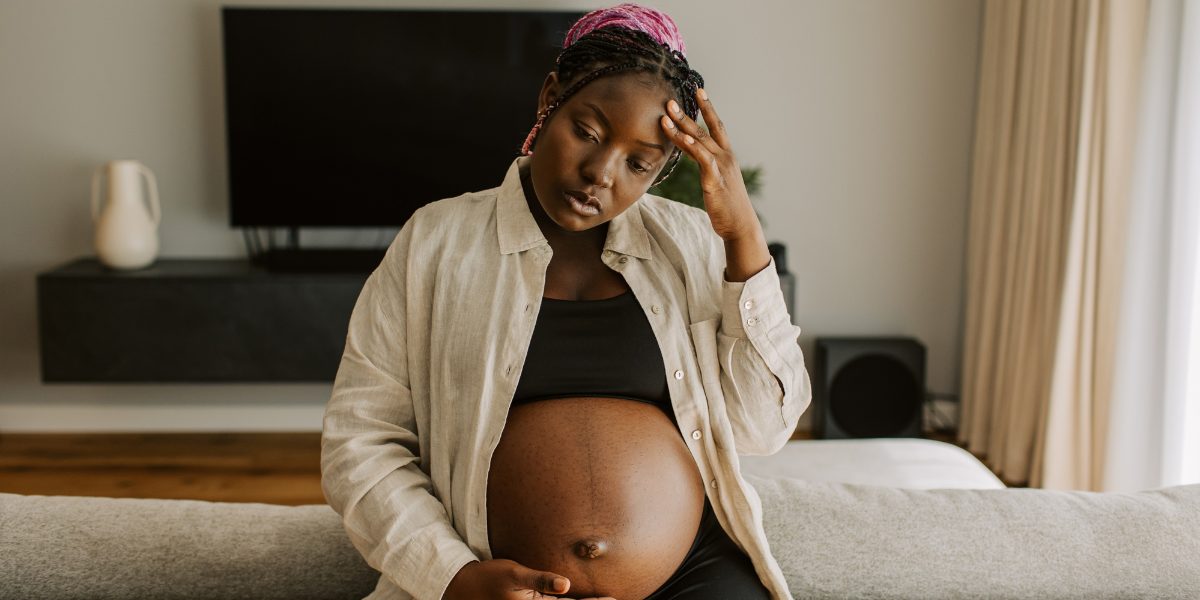Blog > Treatment Strategies > Grief During Pregnancy
Grief During Pregnancy: Supporting Maternal Mental Health After Perinatal Loss
Pregnancy after loss brings a unique and often unspoken form of grief that can significantly impact maternal mental health. This article explores the emotional and psychological effects of perinatal loss, offering mental health professionals evidence-based strategies and therapeutic interventions to support clients navigating this complex journey. From miscarriage to stillbirth, clinicians will gain insights into compassionate, trauma-informed care that promotes healing and resilience.

Last Updated: April 7, 2025


What You'll Learn
-
The emotional and psychological impacts of perinatal loss on maternal mental health
-
Key differences between types of pregnancy loss, including miscarriage, stillbirth, and ectopic pregnancy
-
Evidence-based therapeutic approaches for supporting clients through grief, depression, and trauma
-
How to provide culturally sensitive, trauma-informed care during and after pregnancy loss
Contents
- Pregnancy and Maternal Mental Health
- Perinatal Loss and Maternal Mental Health
- Types of Perinatal Loss
- Interventions for Perinatal Loss
- Emotional and Mental Health Impacts of Perinatal Loss
- Supporting Clients Following a Perinatal Loss
- Target Outcomes for Clients Who Have Experienced Pregnancy Loss
- Therapeutic Interventions for Perinatal Loss
- Individual Grief Counseling and Grief Therapy
- Mindfulness-Based Stress Reduction (MBSR)
- Psychosocial Interventions (Group Support and Technology-Assisted Therapy)
- How ICANotes Supports Clinicians Treating Grief During Pregnancy
- Conclusion
Grief during pregnancy is a deeply complex and often overlooked experience, especially for those who are pregnant after loss. Whether the loss occurred early—such as in a chemical pregnancy, molar pregnancy, or ectopic pregnancy—or later through a late term miscarriage or stillbirth, the emotional toll can be profound. Maternal mental health challenges following perinatal loss are common and frequently under-recognized, despite research showing significantly higher rates of anxiety, depression, and post-traumatic stress among those who have endured this type of loss.[1]
Pregnancy and Maternal Mental Health
Pregnancy is a time of significant physical, emotional, and psychological change. As the body works to support the development of new life, shifts in internal systems–especially hormonal changes–can significantly affect a pregnant individual’s mental health. In addition to those biological changes, external risk factors may increase vulnerability to mental health challenges. These factors include discontinuation or changes in pre-pregnancy medications, marital or relationship issues, pre-existing psychological conditions, and the stress of adjusting to a new work-life balance. [1].
Ideally, a combination of internal stability and external support creates a healthy environment for the fetus to thrive and grow. However, many expectant mothers face circumstances that elevate stress and potentially increase the risk of pregnancy complications or loss. These external stressors may include poverty, unstable housing, or unsafe home environments [1]. It's important to note, however, that in most cases, perinatal loss is not caused by these external factors. The majority of pregnancy losses are unavoidable and occur for reasons beyond anyone’s control [2].
Download our
Pregnancy Loss Toolkit
Equip yourself with essential tools to confidently and compassionately support clients experiencing pregnancy loss or navigating pregnancy after loss.
Perinatal Loss and Maternal Mental Health
Following a pregnancy loss, 20-30% of individuals experience clinical depression, 30-40% develop an anxiety disorder, and 25% experience symptoms of post-traumatic stress disorder [2]. Loss at any stage of a pregnancy can be emotionally and psychologically devastating for the pregnant individual, however within each type of loss, impacts can vary.
Types of Perinatal Loss
Let’s explore the common types of pregnancy loss at varying stages of pregnancy:
Ectopic Pregnancy: An ectopic pregnancy occurs when the egg is fertilized anywhere outside of the uterus, creating life-threatening complications for the pregnant individual. In addition to the risk to the pregnant individual, it also results in a non-viable pregnancy in 100% of cases [3]. Ectopic pregnancies impact 1-2% of all pregnancies.
Miscarriage: Also known as a spontaneous abortion, a miscarriage is categorized as the loss of a pregnancy prior to 20 weeks gestation. Loss at this stage is widely accepted as a loss prior to viability outside the womb and impacts 10-20% of all pregnancies [3].
Stillbirth: Also known as late term miscarriage, this type of pregnancy loss occurs after 20 weeks gestation at a time that the fetus is typically considered to be viable outside of the womb, provided medical intervention. Generally speaking, 1 in every 160 pregnancies result in a stillbirth [4].
Interventions for Perinatal Loss
Treatment for a pregnancy loss at any stage has a deep and profound impact on expectant mothers and can have deep grief, depression, and anxiety effects that last over the course of several years. In fact, women who have experienced a perinatal loss have a three times higher risk of developing suicidal ideation [5].
For some women, typically in the first 12 weeks, the loss of their pregnancy occurs at home with no need for medical intervention. Early miscarriages occur often as a result of chromosomal abnormalities causing the pregnancy to be non-viable and terminate on its own. While this may seem “easier” to some who have experienced later miscarriages needing medical intervention, the experience of loss that an individual endures within the privacy of their own home can create lasting impacts on their mental health, body trust, and hopes for future family planning.
Higher interventions in perinatal loss may be warranted due to gestational age as well as complications requiring surgical intervention. Some women require what is known as a dilation and curettage (D&C) procedure to clear the uterine lining following a miscarriage to ensure no tissue is left behind which may cause further complications. In some cases, women must go through labor to deliver a stillborn baby–an experience that can intensify emotional trauma, as they endure the physical pain of childbirth without the expected outcome of a living child.
Emotional and Mental Health Impacts of Perinatal Loss
Each individual will experience a myriad of complex feelings following a pregnancy loss. Many women feel a profound sense of loss; loss of the child they had planned for, loss of trust in their body doing what was needed to bring that baby to full term, and loss of hope in having the ability to build the family they intended in fear that one miscarriage may turn into multiple miscarriages and long term infertility.
Each unique experience yields a diverse set of mental health complexities as a result of the nature of the miscarriage, complications and procedures associated with the loss, support systems in place, and history of pre-existing mental health conditions. Grief, guilt, anger, depression, and anxiety are all reasonable responses to the loss of a pregnancy. Additionally, perinatal loss has been shown to have a significant impact on maternal mental health in the following ways:
Persistent Grief and Sadness: A significant portion of women experience symptoms of grief in the early days following a pregnancy loss, however what is more poignant is that 57% of women showed clinically significant signs of perinatal grief up to four years following their loss [3].
Clinical Depression: While studies have shown that 20-30% of women who have experienced a miscarriage or stillbirth show signs of clinical depression in the early days following the loss, depressive symptoms still remain present in roughly 11% of women 6 months or more following the loss [3].
Isolation and Guilt: Due to the global discomfort around grief and loss, paired with the complicated nature of perinatal loss at any stage, individuals who experience pregnancy loss often report feeling isolated following a pregnancy loss. Lack of (or perceived lack of) social support, results in high levels of isolation in grief which can exacerbate feelings of guilt associated with the loss.
Supporting Clients Following a Perinatal Loss
Pregnancy loss affects up to 20% of known pregnancies, making it a common experience—but one that is often met with limited support. Because perinatal loss can be deeply isolating, it's essential for clinicians to be equipped with the tools, knowledge, and confidence to effectively support individuals navigating this type of grief.
Target Outcomes for Clients Who Have Experienced Pregnancy Loss
For many individuals seeking care following a miscarriage or stillbirth, the goal is simple: “I don’t want to feel this way any more.” The overwhelming feelings a client may be experiencing can be felt within the shared space due to the acute nature of the pain experienced. For clinicians, this equates to one overarching goal: alleviation of symptoms including depression, grief, anxiety, and trauma. Clinicians supporting these individuals can pare these goals down into a few tangible, actionable goals within the treatment planning stage:
- Reduce depression, anxiety, and trauma symptoms
- Support processing of grief
- Enhance emotional regulation and coping strategies
- Promote long-term mental health resilience
- Engage social supports
Therapeutic Interventions for Perinatal Loss
Therapeutic interventions for supporting an individual following pregnancy loss should be modeled by their unique experience as well as their overarching goals for care. However, within the framework of depression, anxiety, trauma, and grief, there are a few therapeutic interventions that may yield powerful results for individuals in need of care.
Individual Grief Counseling and Grief Therapy
Utilizing Worden’s Tasks of Mourning model of grief, this approach engages strategies such as active listening, narrative storytelling, accounting for shifts in identity over time, and supporting long-term healing strategies under the assumption that we do not “get over” losses we have suffered. This model employs time limited grief counseling or grief therapy sessions that target a basic understanding of the outlined tasks of mourning:
-
Accepting the reality of the loss
-
Processing the pain of grief
-
Adjusting to a world without the baby
- Finding ways to remember the baby while continuing life
A primary tenet of this model is that the clinician and client are not working toward an alleviation of grief, but rather an understanding of the grief being experienced [6].
Mindfulness-Based Stress Reduction (MBSR)
The MBSR approach hinges on a non-judgmental approach to the thoughts and emotions being experienced through the normalization of typically frustrating components of grief including rumination. This method employs gentle redirection and reinforces self compassion through the use of:
- Mindfulness meditation
- Body scanning
- Mindful movement
- Breathing exercises
MBSR can be utilized in individual sessions, through group work, or through take-home audio recordings, making it deeply personalized and accessible for individuals with diverse comfort levels [7].
Psychosocial interventions can be delivered individually or in group settings, and they center on creating a safe, supportive space for emotional expression and connection. This strengths-based, culturally sensitive approach includes storytelling alongside psychoeducation in supportive sessions. The format of these sessions are flexible, allowing for group therapy or telehealth to be very effective [8].
Perinatal loss can be a very sensitive topic, both culturally as well as for the individual client being supported. Clinicians can provide a supportive hand in processing through the complexities of this experience in a myriad of ways.
How ICANotes Supports Clinicians Treating Grief During Pregnancy
When supporting clients grieving during pregnancy or navigating the emotional complexities of being pregnant after loss, clear and compassionate documentation is vital. ICANotes helps clinicians stay present and focused during sessions by streamlining the documentation process, allowing more time for meaningful therapeutic engagement. With built-in templates for grief, trauma, depression, and anxiety, ICANotes enables providers to quickly generate accurate, comprehensive notes that reflect the nuance of each client’s experience.
In cases where clients are navigating intense grief, fluctuating emotions, or perinatal trauma, ICANotes ensures continuity of care by making it easy to track symptom changes, intervention strategies, and treatment goals over time. This level of detailed documentation not only supports clinical decision-making but also strengthens communication with interdisciplinary care teams, should a referral or collaboration be needed. For clinicians working with a high volume of clients, the efficiency and structure ICANotes provides can help reduce burnout and ensure that every client’s story is documented with care.
Conclusion
Grieving during pregnancy and coping with pregnancy after loss are experiences marked by deep emotional complexity. Clinicians play a critical role in guiding individuals through this grief, offering both empathy and evidence-based interventions that promote healing and resilience. By equipping themselves with therapeutic tools and reliable documentation solutions like ICANotes, mental health providers can deliver compassionate, effective care that meets the unique needs of each client. As we continue to normalize conversations around perinatal grief and maternal mental health, we create safer spaces for healing—one session, one story, and one note at a time.
Get Your Free 30-Day Trial (no credit card required!)
Related Posts
Kaylee Kron, LMSW, GC-C, is a certified grief counselor with over a decade of experience. She has worked extensively in nonprofit hospice care, helping individuals navigate their grief journeys. As an author, speaker, and advocate, Kaylee brings a wealth of knowledge and compassion to her work, creating spaces for acknowledgment and healing.







